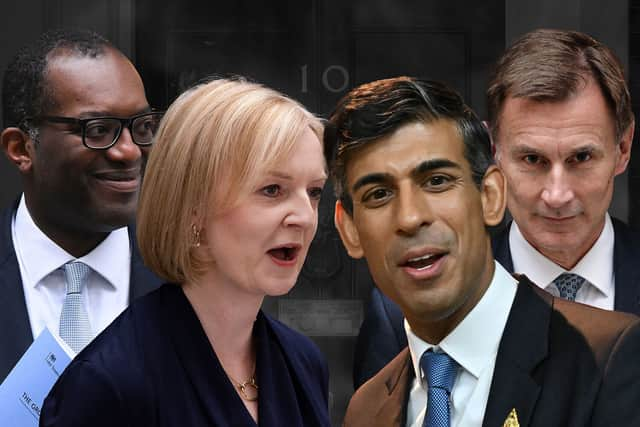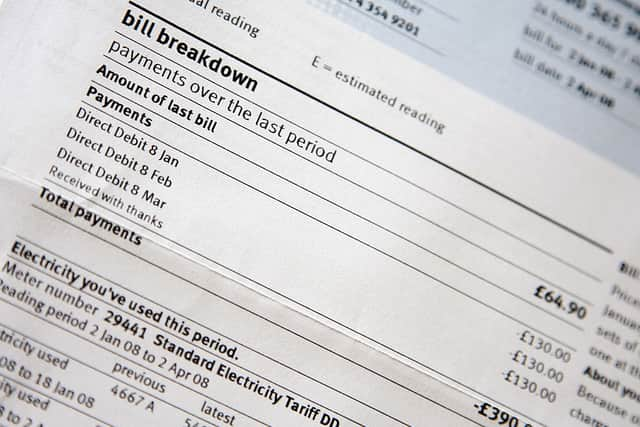Autumn Statement 2022: what Jeremy Hunt said and how it compares to mini budget - tax hikes to energy support
and live on Freeview channel 276
Jeremy Hunt has finally unveiled his highly-anticipated autumn statement, as he tries to get the UK’s economy back on track after months of chaos.
It comes just under two months after the last major fiscal policy announcement - Liz Truss’ and Kwasi Kwarteng’s tax-slashing mini budget. The pair introduced significant cuts to national insurance and corporation tax, and amongst other huge changes, also scrapped the cap on bankers’ bonuses.
Advertisement
Hide AdAdvertisement
Hide AdAt the time, former Chancellor Kwarteng said the new measures would help “turn the vicious cycle of stagnation into a virtuous cycle of growth.” However, this of course was not the outcome - and the mini budget instead plunged the financial markets into turmoil, causing the pound to drop to record lows against the dollar and prompting an emergency intervention from the Bank of England.
In his attempts to rectify this, new Chancellor Hunt has today (17 November) introduced new fiscal plans in the form of an ‘autumn statement’, telling MPs in the House of Commons that “our priorities are stability, growth and public services”. Speaking while Prime Minister Rishi Sunak nodded his approval, Hunt also acknowledged his predecessor’s mini budget, saying that while Kwarteng was “correct to identify growth as a priority, unfunded tax cuts are as risky as unfunded spending.”
The South West Surrey MP confirmed then that taxes will rise, as many predicted, adding that the Office for Budget Responsibility has said that the government’s previous actions - to U-turn on the mini budget - have “already benefited our economy.”
But what exactly has the government announced in the autumn statement, and how does it compare to the mini budget? Here are the key differences - and how they affect you.


Tax cuts vs tax hikes
Advertisement
Hide AdAdvertisement
Hide AdThe most glaring difference between the two financial announcements is the approach to tax. While Truss and Kwarteng opted to slash taxes, Sunak and Hunt have hiked them back up in a bid to curb inflation.
In the mini budget, the government brought forward plans to reduce income tax to 19p in every £1 to April 2023. Controversially, Kwarteng also abolished the top rate of income tax for the highest earners, so that those on more than £150,000 a year would no longer have to pay 45% but instead the lower 40% paid by those on over £50,271.
An increase to National Insurance - which had been introduced back in April by Sunak, when he was Chancellor - was reversed in the mini budget. In practical terms, this meant 28 million workers had more money in their pockets, which on average amounted to an extra £330 a year in take-home pay.
Finally, another planned increase - this time, to corporation tax on big business profits - was also scrapped in the mini budget. Once again, former Chancellor Sunak had decided on the hike after he accepted that the previously low rate had failed to boost investment, but Kwarteng decided that the levy would stay at the lowest rate, at a cost of £19 billion.


Advertisement
Hide AdAdvertisement
Hide AdIn the autumn statement, Hunt was careful to avoid the phrase ‘tax rise’ - but did indeed confirm tax hikes, which the BBC reported would make the tax burden the highest it has been for 70 years.
The Chancellor said the government would be “asking more from those who have more”. He did the opposite of what was done in the mini budget, and reduced the threshold of the 45p income tax rate from £150,000 to £125,140. It means those earning over £150,000 will pay £1,200 more a year in tax.
He also confirmed plans that will affect everyone, however. Namely, the fact that the income tax personal allowance threshold will be frozen until 2028 - meaning millions of people will end up paying more in tax.
The MP said: “I am maintaining at current levels the income tax personal allowance, higher rate threshold, main national insurance thresholds and the inheritance tax thresholds for a further two years taking us to April 2028. Even after that, we will still have the most generous set of tax-free allowances of any G7 country.”
Advertisement
Hide AdAdvertisement
Hide AdFreezing the thresholds means that tax bands will stay the same, even as people’s pay goes up. So as wages rise, the proportion of earnings that we pay tax on will increase, and more people will move into higher tax brackets. The thresholds were already frozen until 2026.


Energy bills support
In the mini budget, the government’s plans for an energy bill relief scheme were confirmed. It came after Truss announced during a speech in the House of Commons that the energy price cap would be frozen at £2,500 a year for a typical home, stopping it from rising to £3,549 in October and to around £5,000 in January. The plan was set to last for two years from 1 October 2022, and was predicted to save the average household £1,000 a year amidst the spirally cost of living crisis.
Despite the Labour Party’s persistent demands, Truss refused to raise the government’s windfall tax on energy giants.
In the autumn statement, Hunt has revealed that energy bills will be increasing. From April 2023, the Energy Price Guarantee that currently caps bills at £2,500 will rise to £3,000 for the average household. This means millions of households will see their energy bills go up by hundreds of pounds.
Advertisement
Hide AdAdvertisement
Hide AdHowever, the Chancellor also announced that there will be more targeted support for the most vulnerable members of society. Those on means-tested benefits will receive an additional £900, while an extra £300 will be given to pensioners and £150 to people in receipt of disability benefits.
The MP also announced that the windfall tax on oil and gas companies will be increased from 25% to 35%. Perhaps in anticipation of some criticism from members of his own party, he added: “I have no objection to windfall taxes if they are genuinely about windfall profits caused by unexpected increases in energy prices. But any such tax should be temporary, not deter investment and recognise the cyclical nature of many energy businesses.”
Hunt also confirmed the government will introduce a temporary 45% levy on electricity generators. He says together these taxes will raise £14 billion next year.


Public spending
In the mini budget, despite all the tax-slashing, the government announced no cuts to public spending. Truss frequently insisted to MPs that there would “absolutely” be no reduction in public spending, which inevitably prompted speculation of U-turns on the £43 billion worth of unfunded tax cuts announced in the mini budget. A few of these predicted U-turns, such as one to the corporation tax cut, ultimately came to fruition during Truss’ short tenure at Number 10.
Advertisement
Hide AdAdvertisement
Hide AdIn the autumn statement, Hunt announced a “difficult” spending squeeze on governmental departments as he strives to deal with inflationary pressures. However, he also unveiled, to the surprise of some, that healthcare and education budgets will be protected - and that spending in these sectors will actually increase.
Speaking on schools, Hunt said: “Because we want school standards to continue to rise, we’re going to do more than protect the school budget - we’ll increase it.” He announced that in 2023 and 2024, the government will invest an extra £2.3 billion in schools.
Meanwhile, NHS spending will be increased in each of the next two years by £3.3 billion. Hunt said he had spoken with the CEO of the NHS, Amanda Pritchard, who reportedly told him this should provide sufficient funding for the health service so it can fulfil its key priorities.
The government is also affording £4.7 billion to social care spending, creating what the Chancellor called “a record £8 billion package for our health and social care spending”. He said this is proof of Conservatives “putting the NHS first”.
Universal Credit and benefits
Advertisement
Hide AdAdvertisement
Hide AdIn the mini budget, rules for those receiving Universal Credit were made harsher. Kwarteng said that people must be fulfilling job search commitments, such as taking active steps to get more or better paid work, or risk having their benefits reduced. He also said jobseekers over 50 will be given extra time with work coaches to help them return to the job market.
In the autumn statement, Hunt said 600,000 more people on Universal Credit will be obligated to meet with a work coach to help increase their hours and earnings. He also said that all means-tested benefits will rise in line with September’s inflation figure of 10.1% from next April, in-keeping with previous promises made by Sunak when he was Chancellor.
Hunt commented: “That is an expensive commitment costing £11 billion, but it means 10 million working age families will see a much-needed increase next year. On average, a family on Universal Credit will benefit next year by around £600. And to increase the number of households who can benefit from this decision I will also increase the benefit cap with inflation next year.”
By law, some disability benefits must rise in line with inflation each year anyway.


What else has been announced in the autumn statement?
Advertisement
Hide AdAdvertisement
Hide AdHunt also unveiled plans for projects such as Sizewell C and Northern Powerhouse rail, as well as what will happen to state pension locks. He confirmed that the National Living Wage will be increased from £9.50 an hour for over 23s to £10.42 from April, which he said represents an annual pay rise worth over £1,600 to a full time worker.
The National Living Wage goes up every April, boosting the pay of around about two million people. But the new rates are announced months in advance, to allow firms to prepare.
Comment Guidelines
National World encourages reader discussion on our stories. User feedback, insights and back-and-forth exchanges add a rich layer of context to reporting. Please review our Community Guidelines before commenting.
